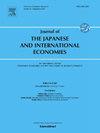Do class closures affect students’ achievements? Heterogeneous effects of students’ socioeconomic backgrounds
IF 3.1
3区 经济学
Q1 ECONOMICS
Journal of the Japanese and International Economies
Pub Date : 2025-09-03
DOI:10.1016/j.jjie.2025.101387
引用次数: 0
Abstract
This paper examines the impact of class closures on the academic achievement of primary and middle school students, with a particular focus on heterogeneous effects related to their household socioeconomic backgrounds. Using administrative data from students in a Japanese city within the Tokyo Metropolitan Area, we analyze the effects of class closures due to influenza epidemics on students’ language and mathematics test scores. Our findings indicate that class closures adversely affect the mathematics test scores of economically disadvantaged students. The magnitude of these negative effects on disadvantaged students varies by subject, grade level, gender, the timing of closures, and students’ prior academic achievement. In particular, male students from economically disadvantaged households are more susceptible to class closures, and those with lower prior academic achievement experience more severe adverse effects. These deleterious effects among economically disadvantaged male students appear to be driven not only by reductions in in-school instructional time but also by behavioral changes that may diminish their learning capacity. Furthermore, we find that high-quality teachers can mitigate the negative impact of class closures on economically disadvantaged students. These results highlight the importance of public programs designed to safeguard student learning environments against such adverse disruptions.
停课会影响学生的成绩吗?学生社会经济背景的异质性效应
本文考察了班级关闭对中小学生学业成绩的影响,特别关注了与家庭社会经济背景相关的异质性效应。我们利用东京大都会区内某日本城市学生的行政数据,分析了因流感疫情而停课对学生语言和数学考试成绩的影响。我们的研究结果表明,班级关闭对经济困难学生的数学考试成绩有不利影响。这些负面影响对弱势学生的影响程度因学科、年级水平、性别、关闭时间和学生先前的学业成绩而异。特别是来自经济困难家庭的男性学生更容易受到班级关闭的影响,而先前学业成绩较低的学生则受到更严重的不良影响。这些对经济条件不利的男学生的有害影响似乎不仅是由于学校教学时间的减少,而且还由于行为上的改变可能会降低他们的学习能力。此外,我们发现高质量的教师可以减轻班级关闭对经济困难学生的负面影响。这些结果突出了旨在保护学生学习环境免受此类不利干扰的公共项目的重要性。
本文章由计算机程序翻译,如有差异,请以英文原文为准。
求助全文
约1分钟内获得全文
求助全文
来源期刊
CiteScore
5.10
自引率
6.90%
发文量
36
期刊介绍:
The Journal of the Japanese and International Economies publishes original reports of research devoted to academic analyses of the Japanese economy and its interdependence on other national economies. The Journal also features articles that present related theoretical, empirical, and comparative analyses with their policy implications. Book reviews are also published.

 求助内容:
求助内容: 应助结果提醒方式:
应助结果提醒方式:


